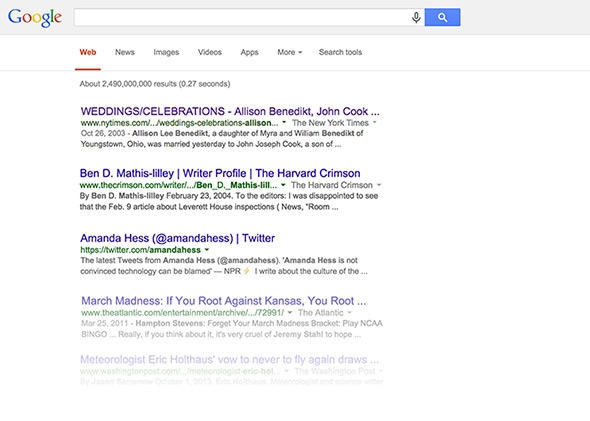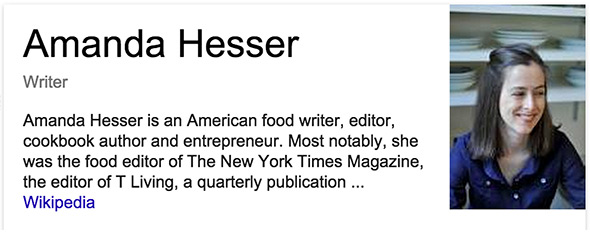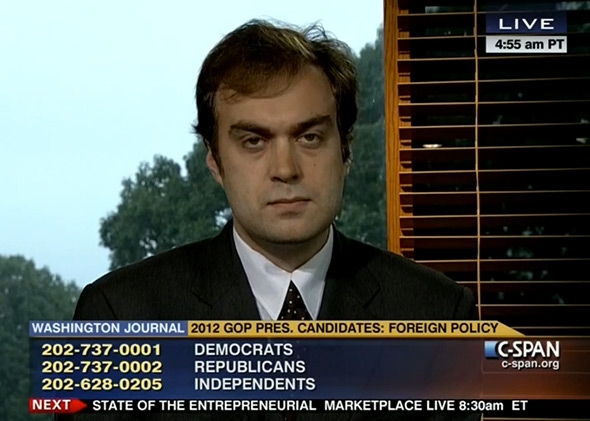Slate Gets Results
We Googled ourselves. It wasn’t the first time. It won’t be the last.

Here at Slate, we are not just human beings. We are also writers. Which means that, while you spend your leisure time hanging out with friends or taking a nice jog, we are at home googling our own names. Most of what comes up on the first few pages of a self-googler’s search results these days are your garden variety social media pages—you got your Facebooks and your Twitters and your LinkedIns. We went beyond those to explore the results we are most proud of, or embarrassed of, or confused by. When you’re done reading ours, go ahead and Google your own name and, in the comments, tell us what comes up. Then, if your ego hasn’t been irreparably shattered or excessively inflated, resume your more productive life.
Ben Mathis-Lilley

Since the very second that college newspaper archives started getting put online, they’ve been a source of humiliation. And as you’ll find when you Google me, I Was Once a Self-Consciously Transgressive College Newspaper Writer too. The good news, at least in my opinion, is that the top result on my Harvard Crimson author page is not completely embarrassing! It’s called “Fifteen-Love,” and it’s a culmination of a campaign that I and the two other leaders of the Crimson’s weekend magazine led to persuade then-Harvard president and former Secretary of the Treasury Larry Summers to play tennis with us.
Summers is known as a particularly committed player in Washington, D.C.’s high-powered tennis networking circles. After nearly a year of requests, he agreed to play with the three of us shortly before we graduated. So we wore goofy outfits, played doubles with him (badly), and wrote up the experience at great and self-indulgent length in an “oral history” format. It’s pretty funny!
Ben M: I needed a collared shirt and a sweatband. The sweatband was no problem, but the only short-sleeved shirt with a collar that I own is really heavy and not at all conducive to exercise. In addition to limiting my range of arm motion, thus severely hindering my groundstrokes, it led to excessive perspiration. Altogether, though, the sweating just added to my overall aura of manly intensity, which I think really impressed the ladies who were watching.
Irin Carmon, associate editor and female courtside observer: Ben Mathis was just drenched in sweat. It was totally gross. He also kept winking at me after he double-faulted. I thought about leaving.
Perhaps as a result of this traumatizing experience, Irin Carmon is now a leading national voice on women’s issues in her role as a commentator for MSNBC. Things really worked out for everyone! Except Larry Summers, who was forced out of the Harvard presidency a few years later after a series of controversies involving his perceived racial and gender insensitivity. Whoops.
Amanda Hess

I am dominating the left-hand margin of the “Amanda Hess” Google results page. Search my name, and you’ll find my Slate archive, Twitter account, Tumblr, personal website, LinkedIn profile, and a thing I wrote. It’s all me, baby. But on the right-hand side, Amanda Hesser reigns. Google pipes the highlights of her Wikipedia profile into a special gray-lined box: Her New York Times cookbook, her two James Beard Awards, her sublime in-the-kitchen headshot. Sometimes, her fans accidentally gush in my direction: A maker of sugar-free candies is “so excited” about seeing me at a local food expo; Anne-Marie Slaughter loves “my” food writing. Meanwhile, my readers tweet at Amanda Hesser to rant at her about cheerleading and call her paranoid. She’s gracious about it. Here's how she framed the experience last year: “The great thing about getting confused for @amandahess is that I get lots of passionate feedback on stories I didn’t write.” OK. She can stay.
Joshua Keating

C-SPAN screenshot
You can have your Morning Joes and Foxes and Friends and whatever CNN’s thing is. For my money, the best morning political talk show on television for 20 years running has been C-Span’s Washington Journal. If you haven’t seen the show, it’s just three full hours of guest journalists and politicians and C-Span’s unflappably Zen hosts taking unscreened viewer phone calls. Some critics have faulted the show for giving a platform to racists, anti-Semites and conspiracy theorists, which it does, but the format also forces guests off their standard talking points like nothing else on TV.
I’ve been on Washington Journal twice, and if you Google my name, you’ll find my contributions to the show on the third page of results, which seems about right—if someone is interested enough in me to click to the third page, I’m glad it’s there. My first time on the show, which unfortunately doesn’t appear to be available with audio anymore, I went on to talk about the overlooked international stories of 2008 and took a question from a viewer in Baltimore about “Raytheon—the weapon that can control minds.”
“Why don’t we just ship a large number of these mind-control weapons and make everyone peaceful and end the war?” the viewer, quite reasonably, asked. I didn’t have a good answer. Another caller asked for my “religious background” and whether I had experience in “foreign intelligence.” I answered vaguely and managed not to betray the Elders of Zion.
My second appearance, talking about foreign policy and the GOP primary in 2011, featured fewer colorful callers. But watching it today, I find it much more embarrassing for how disheveled I look and the degree to which I seem to be taking Jon Huntsman’s presidential campaign seriously.
For the full Morning Journal experience, check out this brief clip, which features a David from Silver Spring mixing up “Osama” and “Obama” as well as me making a face like a puritanical dork when Matt from Kansas City drops an F-bomb on the air. Host Robb Harleston, who’s heard much worse, handles it with aplomb:
Jeremy Stahl

In 2011, I contributed to Slate’s March Madness “Teams We Hate” package with a post about how it was fun to root against the University of Kansas. Sports writer Hampton Stevens did not take kindly to me criticizing his beloved Jayhawks and their choking ways. So he wrote a 1,260-word Atlantic essay about how awful a human being you would have to be to jeer such a historic team, and specifically how awful a human being I am. In it, he referenced my surname 12 times and my first name eight.
Walking through the history of Kansas basketball, Stevens explained that “hating on the Jayhawks means you hate the United States of America.” In my case, it meant that I also wanted President Obama to fail, supported “racism, oppression, and war,” hated the NCAA tournament, and wanted Yao Ming to live in poverty (“Really, if you think about it, it's very cruel of Jeremy Stahl to hope that Yao Ming lives in poverty,” is an actual thing that the Atlantic published about me.)
I don’t know Stevens personally, but if he was hoping to upset me, he failed. I took the attempted Google bombing—not as effective, personally damaging, or funny as Santorum’s, but still good—as a compliment, reading choice lines from it at my Passover seder (“With due respect to Richmond Spider fans—some of whom, unlike Jeremy Stahl, may not actually be pro-slavery—basketball in Kansas isn't a casual thing,” certainly made my sister laugh.) Even if none of it was true, it was one of the funniest things anyone’s ever written about me. Sadly, though, Hampton Stevens’ “Jeremy Stahl” essay doesn’t show up until Page 7 of my Google results.
Allison Benedikt

A few weeks ago, I caught my 6-year-old son attempting to Google my name. I panicked and slammed the laptop shut, but clearly it’s only a matter of time before he finds out that I hate private school, dogs, and Israel. I can live with that. But the one result that won’t be so easy to explain: Mommy, why did you submit your marriage announcement to the New York Times? is not a question I’m prepared to answer at this time. The answer, however, is right there in the announcement: “The bride, 26, and bridegroom, 30, work at The Chicago Tribune, where she is a features editor and he is a reporter, covering television.”
I had moved from Brooklyn to Chicago with “John Joseph Cook, a son of Alexandra Warhol of Alexandria, Va., and Joseph T. Cook of Corona del Mar, Calif.” a few years earlier, disliked it from day one, and longed to be back in New York City, where everything important happened. Although I am “a daughter of Myra and William Benedikt of Youngstown, Ohio” who “graduated from the University of Michigan,” I am also a New Yorker, or liked to think of myself as one, and hated every day that I was stuck in a city that couldn’t compare. I had a bad case of status-anxiety and not enough self-awareness to see that my transparent desperation to be validated via a wedding announcement was pretty much the most Chicago thing ever. (See you in comments, Chicago people.)
Anyway, 12 years later, I’m embarrassed that I submitted the announcement and embarrassed that I was happy when it got in. Still, if my kids eventually click on the thing, at least they will know their grandmother was "a computer programmer," which, unlike trying to get my name in the pages of Sunday Styles, is actually cool.
Eric Holthaus
I stopped flying for good in September 2013 to cut back on my carbon footprint and tweeted about it—a decision that changed my life but more importantly also changed my Google search results. On the first page of results is an Oct. 2013 article written by my friend and colleague Jason Samenow at the Washington Post's Capital Weather Gang blog. It’s probably the most even-handed assessment of reactions to my pledge, including one from our mutual friend Andrew Freedman, now the science editor at Mashable.

At the time, Andrew tweeted that my vow, and the personal passion that prompted it (I’m doing it for the climate!) “undermined my credibility” as a climate reporter. Of course, I strongly disagreed. This week, I contacted Andrew to see if he still thinks that way. His response: “It’s become part of your brand now, it’s not so much something that compromises your coverage as something that symbolizes it. So I’d say no, if this were a yes or no question.” Vindicated! Lesson to be learned here: If you feel strongly enough about an issue, wait for an emotional outburst and send out a flurry of life-changing tweets. Eventually, your critics will come to respect you.